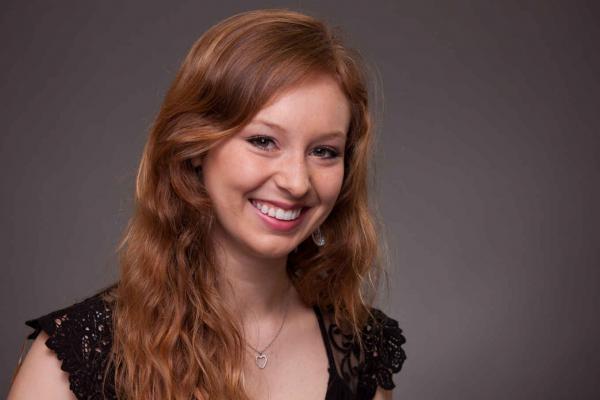Emily Evans plans to join the Peace Corps, and perhaps go on to become an emergency room trauma surgeon. But first, she’ll finish up her undergraduate degree in biomedical engineering at Georgia Tech. Evans is in her third year as BME student and only recently declared herself as pre-med, but she’s been drawn to medicine since she was a little girl.
“My mom has a Ph.D. in neuropsychology and works at the University of Mississippi Medical Center in Jackson, where I’m from,” Evans said. “I learned from her early on that medicine comes with long hours and high stress levels, but it pays you back tenfold because it’s so intensely rewarding.”
Evans’ mother works with patients who have experienced a traumatic brain injury, helping evaluate the condition of their brains and determining which skills they’ll likely be able to recover. Evans, on the other hand, wants more of a hands-on role.
“I want to be the doctor that sees the patient as soon as he’s wheeled into the E.R.,” Evans said. “Those high-pressure, life-or-death situations are what drive me, because your actions lead to instant results.”
That craving for immediate, tangible results has lead Evans to shy away from the research side of the field pursued by many of her peers. Scientists might spend years in the lab working on a single study, she says, only to make a small advancement.
After her freshman year at Tech, Evans completed a research internship at the University of Mississippi Medical Center. She analyzed cross-sections of brain tissue, working to understand the relationship between circadian rhythms and drug dependency. The technical skills she learned are useful, Evans says, but the experience helped her decide that long-term research isn’t for her.
Instead of spending time in the lab, Evans has devoted the past year to volunteering in the emergency room at Grady Memorial Hospital in downtown Atlanta. She transports patients, changes sheets, and lends a hand wherever possible.
“The doctors and nurses in a trauma setting can always use more help,” Evans explains. “If I can take some of the workload off of them, it means they’re able to see more patients and maybe even save another life. That’s rewarding, and it makes a difference.”
For Evans, serving others is a passion. She says it’s sometimes difficult to find a balance, because preparing for the possibility of medical school requires investing the majority of her time in her own education.
It’s why, after graduation, she plans to take a hiatus from her studies.
“I plan to serve in the Peace Corps for two years, hopefully working in some sort of medical setting in a developing country. Medical school will always be waiting for me when I get back.”
That is, if she ultimately sticks to her pursuit of a medical degree. Evans also enjoys the research & development aspect of biomedical engineering, which she’s been exposed to through her courses at Georgia Tech.
In 2015, she’ll pursue an internship with a biomedical engineering company to test the waters.
“I would love to intern with a company that produces medical devices, communicating with doctors to see what works and what could be improved,” Evans said. “It’s a job that melds two of my passions–engineering and medicine–so I’m interested to see if it’s something I enjoy.”
Evans says finding what you love is all about trying new things.
No stranger to adventure, she spent a semester studying abroad at Georgia Tech-Lorraine in France. The experience expanded her worldview, she says, and pushed her toward a vocation that will allow her to work globally.
With so many different career options, Evans says the advisors and faculty within the Coulter Department of Biomedical Engineering have been an enormous resource.
“Sally Gerrish is amazing,” Evans said of the college’s manager of student, alumni and industrial relations. “She’s always there to share personal advice and connect you to helpful people. If she doesn’t have an answer for your question, she’ll find someone who does. She has an incredible network of contacts.”
Between networking, volunteering and–oh yes–studying, Evans feels confident she’ll wind up in the right place.
“Whether it’s in the E.R. of a local hospital or working on the ground in a third-world country, I know my career will be built on the foundation I’ve received at Georgia Tech,” she said. “I’m ready to contribute something big to the world.”
Connect with Emily Evans on LinkedIn
Written by Chris Calleri
Media Contact
Chris Calleri
Communications Manager
Wallace H. Coulter Department of Biomedical Engineering
Georgia Institute of Technology & Emory School of Medicine
313 Ferst Drive, Suite 2120
Atlanta, GA 30332-0535
Phone: 404.385.2416
Latest BME News
Jo honored for his impact on science and mentorship
The department rises to the top in biomedical engineering programs for undergraduate education.
Commercialization program in Coulter BME announces project teams who will receive support to get their research to market.
Courses in the Wallace H. Coulter Department of Biomedical Engineering are being reformatted to incorporate AI and machine learning so students are prepared for a data-driven biotech sector.
Influenced by her mother's journey in engineering, Sriya Surapaneni hopes to inspire other young women in the field.
Coulter BME Professor Earns Tenure, Eyes Future of Innovation in Health and Medicine
The grant will fund the development of cutting-edge technology that could detect colorectal cancer through a simple breath test
The surgical support device landed Coulter BME its 4th consecutive win for the College of Engineering competition.








